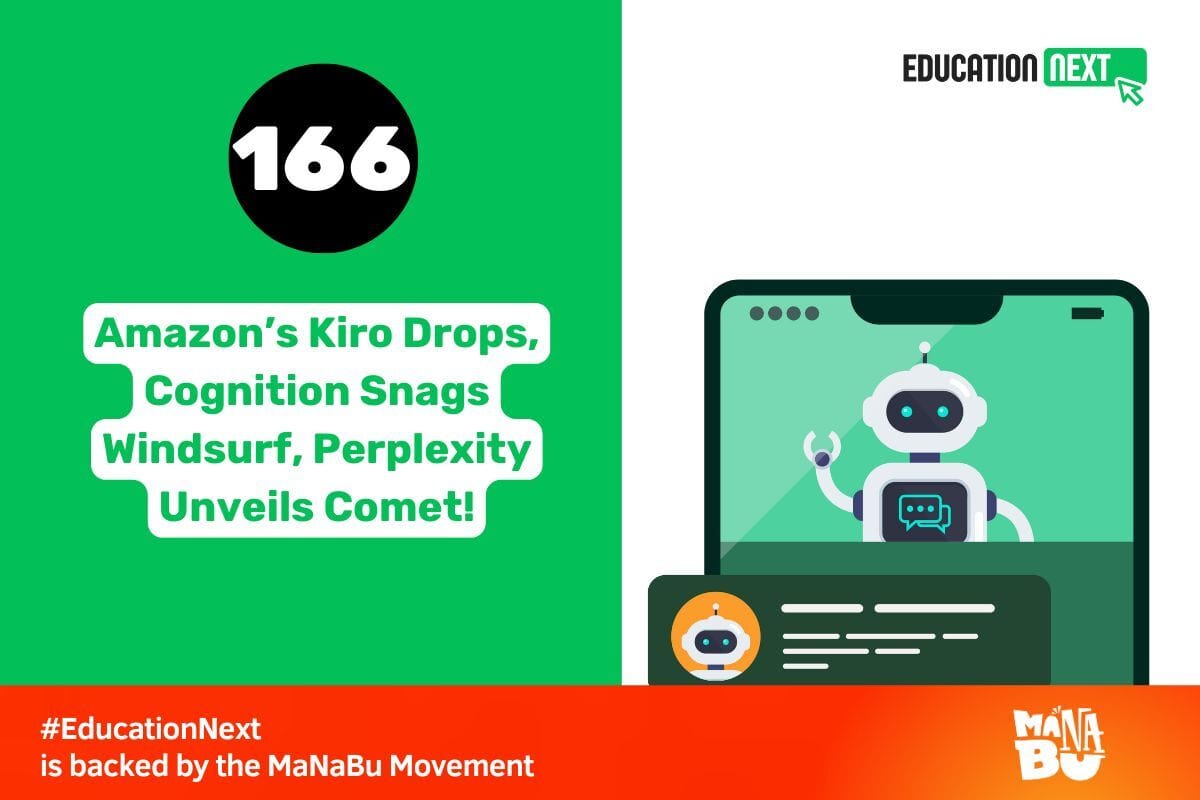- Education Next
- Posts
- #166: Amazon’s Kiro Drops, Cognition Snags Windsurf, Perplexity Unveils Comet!
#166: Amazon’s Kiro Drops, Cognition Snags Windsurf, Perplexity Unveils Comet!
Education Next- Hundred and sixty-sixth Edition

July 20, 2025.
Welcome to your weekly roundup of the hottest AI-driven development news.
Amazon’s Kiro IDE enters the fray, Cognition acquires Windsurf, and Perplexity’s Comet reimagines browsing.
Here’s what’s reshaping coding this week! Top Stories:
Amazon’s Kiro: Claude-Powered IDE for Structured Dev
Amazon launched Kiro, an AI-native IDE built on Code OSS, powered by Claude Sonnet 4.0 and 3.7. Now in public preview at kiro.dev, Kiro plans, writes, debugs, and documents code in real-time with a spec-driven workflow.
It generates requirements, designs, and tasks, keeping specs synced with code to streamline enterprise projects.
Why it matters:
Kiro’s structured approach could tame vibe-coding chaos, rivaling Cursor and Copilot.
Cognition Acquires Windsurf: A Power Move in AI Coding
Cognition, creators of Devin, acquired Windsurf, a leading AI IDE innovator, ensuring all 250 team members join with full vesting.
After Google poached Windsurf’s CEO Varun Mohan and key R&D staff for DeepMind in a $2.4B deal, Cognition swooped in for the IP, brand, and remaining talent.
What’s next?
This bolsters Cognition’s push to redefine software engineering with agentic AI.
Perplexity’s Comet: The AI Browser Revolution
Perplexity’s CEO Aravind Srinivas unveiled Comet, an AI-powered browser pitched as a “cognitive operating system.”
Beyond traditional browsing, Comet integrates AI to create intuitive workflows, transforming how developers and users interact with the web.
Why it matters:
It’s a bold step toward AI-driven interfaces, potentially impacting dev tool ecosystems.
Eric Schmidt’s AI Vision: Economic Growth, Higher Wages
Former Google CEO Eric Schmidt views AI and automation as economic accelerators, initially targeting low-status, high-risk jobs and then progressing to higher-status roles.
Workers using AI assistants, like welders operating robotic arms, will access higher-paying roles. “AI acts as an accelerant, enabling average-skilled workers to take on higher-value tasks,” Schmidt says, predicting more widgets, higher profits, and expanded opportunities.
Why it matters:
AI’s synergy with human skills could reshape job markets, boosting wages and productivity.
🔥 Stay Ahead of the Curve
The future is happening NOW. The question is—are you evolving with it?
👉 Subscribe to stay ahead → educationnext.beehiiv.com
🎯 Please share this with someone who needs to hear it.
Let’s Stay Connected!
Subscribe to our YouTube channel.
Stay inspired with EducationNext
EducationNext is a collaborative newsletter produced by thought leaders in education, worldschooling, digital nomadism, remote work, and AI.
EducationNext provides insights, updates, and thought-provoking content. The collaborators share their know-how/ do-how, experiences, and insights, making EducationNext the resource for the intersection of education, technology, and mobility - anytime, anywhere.
EducationNext is backed by the #MaNaBuMovement
.jpg)
.jpg)
.jpg)
.jpg)